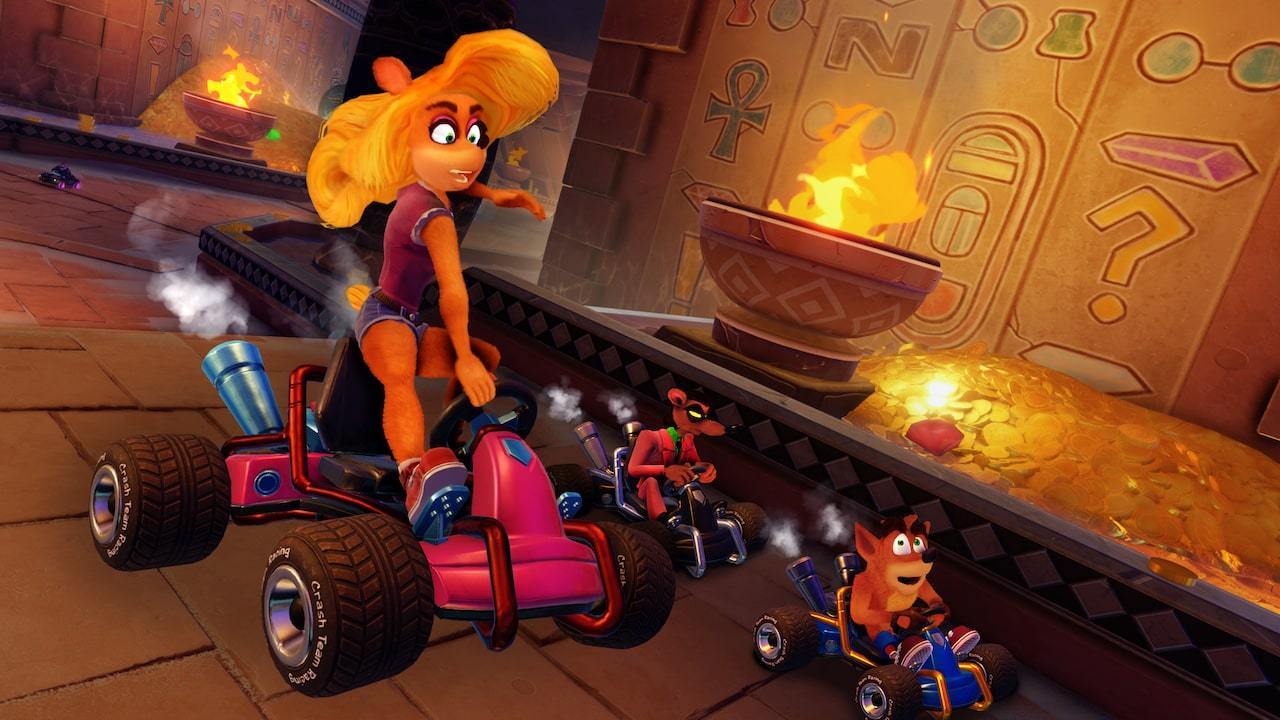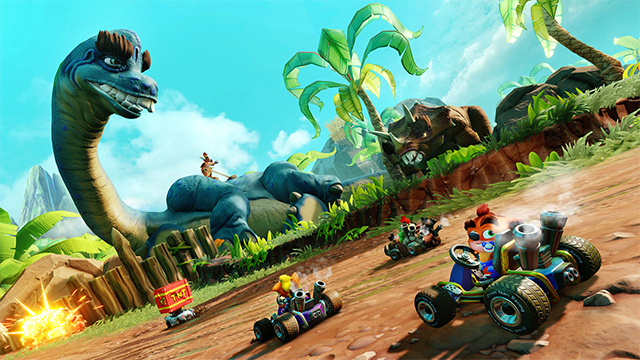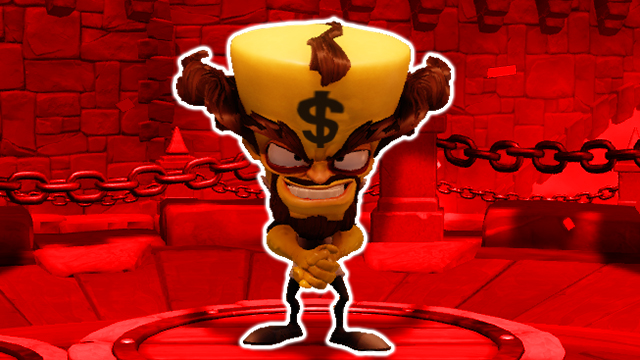While they aren’t in the game just yet, Activision has announced that players will be able to purchase in-game currency in Crash Team Racing Nitro-Fueled using actual money. Considering the kart racer is a remake of PlayStation title originally released in 1999, the announcement is pretty insidious in nature. It shows how the publisher has changed the very nature of the beloved classic into a modern “games as a service” release with timed events that capitalize on players’ fear of missing out and an entire progression system built around pushing players to spend money or constantly grind. While the updated visuals show how Beenox brought the title up to 2019 standards for the better, the Crash Team Racing microtransactions demonstrate when the polar opposite happens and how a lack of transparency can make the whole thing worse.
ALSO: Best Switch Racing Games | From Mario Kart 8 Deluxe to Virtua Racing
This is not an issue unique to Crash Team Racing, though. In fact, it’s not even the first time that Activision has shoehorned microtransactions into a remake of a beloved title after it was released. Back in late 2016, the publisher pushed an update to Call of Duty: Modern Warfare Remastered that added in microtransactions via what the game calls Supply Drops. The Supply Drops were all purely cosmetic items, which seems to be the magical pass that a lot of companies use to prey upon those that don’t have impulse control. So while it didn’t impact the competitive play any, it was still a greedy move that tainted a beloved classic with current-day marketing plans.
This is a troubling industry trend that is emerging and being seen more as of late. The turning point seemed to be back in late 2017 when Electronic Arts removed microtransactions from Star Wars Battlefront 2 due to widespread controversy that sullied its word of mouth during its launch and gave the game a terrible reputation. By mid-2018, the microtransactions were added back in, albeit changed so that they were just cosmetic items. However, if microtransactions can hamper a launch of a game from one of the biggest multimedia franchises ever, then it can happen to any title, and publishers are now reluctant of putting them in upon release.
Now these companies wait a month or two — after the game has hopefully received a positive reception — and add them in just like Activision also did with Black Ops 4. This delayed approach is even more repulsive than just including them outright as they’re playing with consumer expectations and making critics look like fools by playing them to their advantage. Even if some reviewers can see it coming, it is still going to blindside other players.
We should’ve known that Crash Team Racing microtransactions were coming

The Crash Team Racing microtransactions are all the more infuriating because the game’s system foreshadowing their eventual inclusion. Critics complained about the seemingly unfair difficulty curve in spots, forcing them to replay levels, and of the progression system that felt like a grind to unlock new items in. These could be dismissed as issues that would be fixed in future updates, but once microtransactions were announced, it started to make more sense. Even if it is an unfortunate coincidence, the entire remake was built around the currency system that has players spend coins to unlock new characters, karts, and more. And those coins are already hard to earn, especially for offline players. Now it also has the added weight of being tied to real money because it almost makes it seem as though it’ll be too difficult for some to rightfully earn those expensive cosmetics through gameplay.
With hindsight in mind, it would be easy to criticize both fans and media for not putting two and two together earlier, but only Activison can be blamed here. Developer Beenox gave E3 meetings that told members of the press that there would be no microtransactions in Crash Team Racing and used that as a selling point. Or, at least, that is how it probably sounded. It’s entirely possible (and plausible) that the statement was worded in a way that suggested that microtransactions weren’t coming at launch or, at least, not saying they wouldn’t come to the game eventually. While a little different, the Borderlands 3 microtransactions debacle shows how it looks when the message is not 100% clear and worded in a way that won’t garner negative press.
It’s simple to understand that changes happen during development and that the previous assurances that there would be no additional monetary transactions could have been done in good faith at the time. However, whether held back by Activision or not, the fact that Beenox didn’t set the record straight prior to launch alongside the game’s roadmap is not a good look and lacks transparency. Activision wasn’t about to open itself up to backlash when it was being celebrated for bringing back a beloved racing game complete with plans for free updates and DLC coming down the line.
The game’s free seasons of content have been mostly great and might partially excuse the microtransactions but they’re also what makes the system seem a bit more insidious. By completing races and challenges in a season, players earn Nitro Points that fill up like a battle pass-like meter and dish out rewards along the way. Certain cosmetics give players an added boost that fill up the bar faster and a good portion of these cosmetics can only be purchased in the in-game store with Wumpa Coins. So if players want to level up faster and earn more time-sensitive gear, they’re encouraged to buy these skins in the store through fake coins or — once the microtransactions go live — real money. Want a Nitro Point boost so you can earn the limited-time Baby T.Rex racer? You can do that a little faster by buying the limited-time Sabertooth Pura skin in the shop. FOMO and microtransactions usually go together but this indirect way of going about it almost feels it was designed so we wouldn’t notice how greasy it is.
This should not become the new normal

No matter what the intention was it how they were included, Activision lied — either directly or by omission — to the press and to the players. The publisher played everyone that made the game an instant commercial success and gave everyone a one giant middle finger to everyone involved after riding the positive reception. It adds a negative light to all of the great work done by developer Beenox — which probably had little say in the matter — and on the game itself. And while microtransactions have a place, it’s morally dubious to be putting them in a game that is clearly targeting children as its main audience (as well as people who played the original in their childhood).
Although it is pretty ridiculous to insert them into a game that is, at its core, two decades old, the main issue isn’t that the game has microtransactions. It’s mostly how Activision was deliberately misleading people and not beng transparent on top of their shady implementation. Communication is important and it can be the vital difference between a publisher being loved or hated.
There are still a lot of questions surrounding the microtransactions themselves as they haven’t been implemented just yet. This is yet another failure at communication, which is mostly the problem here. We don’t know how much a dollar will go in the in-game store, or even when they will launch other than a vague “early August” date. Either way, it’s given a great retro revival a partially black eye that it shouldn’t have and Activision’s own greed has killed a lot of the goodwill it had received in the past two years by bringing back Crash Bandicoot and Spyro the Dragon.











